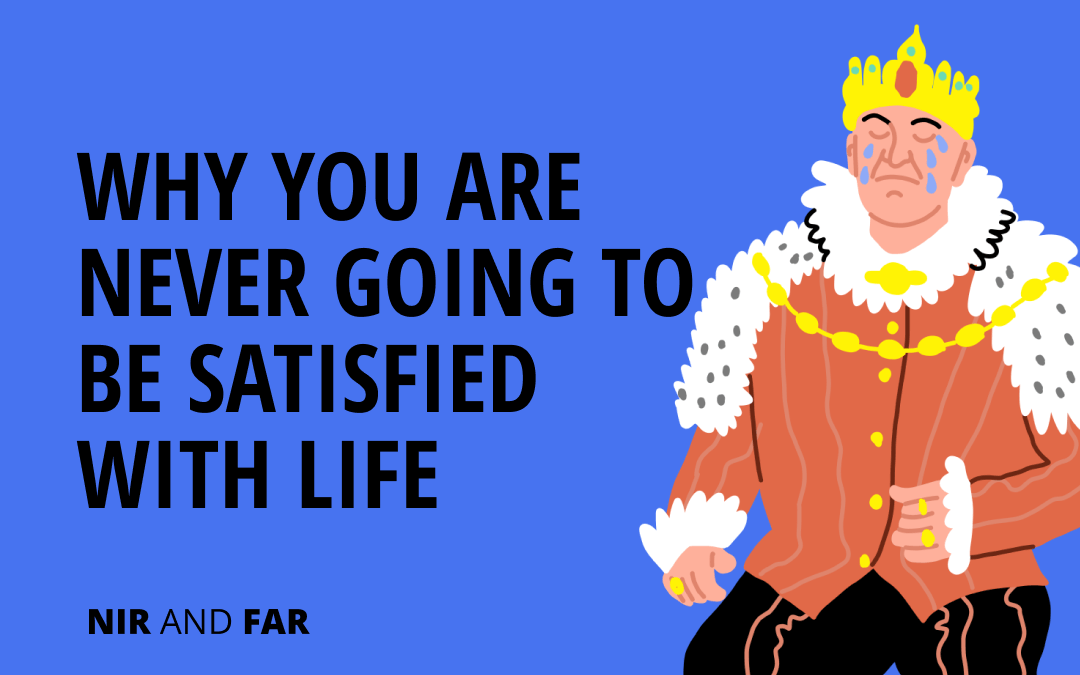Why are we perpetually restless and unsatisfied? We live in the safest, healthiest, most well-educated, most democratic time in history—and yet, some part of the human psyche causes us to constantly look for an escape from things stirring inside us.
As the eighteenth-century poet Samuel Johnson said, “My life is one long escape from myself.” Me too, brother. Me too.
The truth is, we’re not wired to feel content or satisfied. Ever.
There’s a simple reason for that: as expressed by researchers for the Review of General Psychology, “If satisfaction and pleasure were permanent, there might be little incentive to continue seeking further benefits or advances.”
In other words, feeling contented wasn’t good for the species.
Our ancestors worked harder and strove further because they evolved to be perpetually perturbed, and so we remain today.
The Four Components of Dissatisfaction
Four psychological factors make satisfaction temporary.
The first is boredom. The lengths people will go to avoid boredom are shocking. Literally.
A 2014 study published in Science observed participants who were asked to sit in a room and think for fifteen minutes. The room was empty except for a device that allowed participants to mildly but painfully electrocute themselves.
“Why would anyone want to do that?” you might ask.
When asked beforehand, every participant in the study said they would pay money to avoid being shocked. However, when left alone in the room with the machine and nothing else to do, 67 percent of men and 25 percent of women shocked themselves. Many did so multiple times.
The study demonstrated that people dislike being alone with their thoughts so much, they’ll prefer to do anything else, even if that activity is negative.
It’s no surprise, therefore, that most of the top twenty-five websites in America sell escape from our daily drudgery, whether through shopping, celebrity gossip, or bite-sized doses of social interaction.
The second psychological factor driving us is negativity bias.
It’s been defined as “a phenomenon in which negative events are more salient and demand attention more powerfully than neutral or positive events.”
As the author of one study concluded, “It appears to be a basic, pervasive fact of psychology that bad is stronger than good.”
Such pessimism begins very early in life. Babies begin to show signs of negativity bias starting at just seven months of age, suggesting this tendency is inborn.
Researchers also believe that we tend to have an easier time recalling bad memories than good ones. Studies have found people are more likely to recall unhappy moments in their childhood, even if they would describe their upbringing as generally happy.
Negativity bias almost certainly gave us an evolutionary edge. Good things are nice, but bad things can kill you. That’s why we pay attention to the bad stuff first and remember it better. Useful for the species—but what a bummer!
The third factor is rumination, our tendency to keep thinking about bad experiences.
If you’ve ever chewed on something that you did, or that someone did to you, over and over again, then you’ve experienced rumination.
This “passive comparison of one’s current situation with some unachieved standard,” (citation) can manifest in self-critical thoughts such as, “Why can’t I handle things better?”
As one study notes, “By reflecting on what went wrong and how to rectify it, people may be able to discover sources of error or alternative strategies, ultimately leading to not repeating mistakes and possibly doing better in the future.” That’s another potentially useful process—but boy, can it make us miserable.
A fourth factor may be the cruelest of all. It’s hedonic adaptation, the tendency to quickly return to a baseline level of satisfaction no matter what happens to us in life.
Hedonic adaptation is Mother Nature’s bait-and-switch. All sorts of life events we think would make us happier actually don’t—or at least, not for long.
As David Myers writes in The Pursuit of Happiness, “Every desirable experience—passionate love, a spiritual high, the pleasure of a new possession, the exhilaration of success—is transitory.”
Of course, as with boredom, negativity bias, and rumination, there are evolutionary benefits to hedonic adaptation.
As the author of one study explains, as “new goals continually capture one’s attention, one constantly strives to be happy without realizing that in the long run such efforts are futile.”
Humans may be wired to pursue happiness, but we’re not too well equipped to experience it.
Dissatisfaction is Not Defeat
The takeaway here is that if you’re unhappy, you’re normal.
Dissatisfaction is responsible for our species’ advancements, and if you never felt it, you’d be at a serious disadvantage. Discontent is not a reason to give up on success. Rather, it’s a reason to introduce the opportunity for frequent and meaningful victories into your life.
It’s important to understand that struggle and hard times are just part of being human.
High achievers push themselves through the discomfort and discontent, rather than trying to escape it with distraction.
Every day is a chance to live according to your values, which I define as attributes of the person you want to be. Living out your values means spending your time purposefully on the things that you decide are important.
You can do this—very concretely—if you build your values into your calendar. That means scheduling time for what matters most.
At the end of the day, you can look at what you intended to do, compare it to what you ended up doing, and celebrate your victory when you stayed on track.
When you live up to your values, instead of distracting yourself from feeling discomfort and discontent, you become indistractable.
Related Articles
- Schedule Maker: a Google Sheet to Plan Your Week
- Habit Tracker in Google Sheets – Free Template
- A List of 20 Values [and Why People Can’t Agree On More]
- Timeboxing: Why It Works and How to Get Started in 2024
- An Illustrated Guide to the 4 Types of Liars
- Hyperbolic Discounting: Why You Make Terrible Life Choices
- Happiness Hack: This One Ritual Made Me Much Happier

